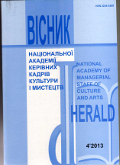The Role of the Modern Ukrainian Family in the Formation of Cultural Identity
DOI:
https://doi.org/10.32461/2226-3209.4.2013.138059Keywords:
Ukrainian family, culture, personality, upbringing, socializationAbstract
The article deals with the formation of cultural identity in modern Ukrainian family, analyzes the role of family socialization features. Considerable attention is given to cultural and educational potential of the family and its influence on the cultural identity formation. Process of identity formation is always largely determined by the specific socio-cultural factors which were shaped by centuries of historical development. Family as a social institution deserves priority attention among those fundamental factors. Family – first principle of society. It is a certain social group in which most individual characteristics of the parents , their children and other family members showed through their behavior and personality development which are formed with self-knowledge, self-actualization and socialization of its members. Family by its characteristics is a social structure that goes through various stages of growth and development and through improved performance of its functions. It enriches the treasury of material and spiritual values of the people. The material and moral responsibility of family members to each other and to society is the main feature on the basis of these theoretical studies , modern family has to become a key element in the individual`s education and socialization. Proceeding with historical and modern conceptions of identity, a person in the epicenter of culture, is the highest spiritual value which becomes it`s spiritual essence and a part of humanity. The person develops it through culture. The cultural essence of personality is the backbone component of its integrity. Cultural values in the socio-cultural sphere are achieved by the beliefs of humanity that were formed and still continue to grow in the transformation of the socio-historical situation. The succession of generations is a process of mutual transfer, assimilation, storage and use of material and spiritual values, social information and experience of previous generations where the family plays an important role. The family in Ukraine fells under the influence of transformation of socio-cultural and political processes and transformations. They reflect on it and led to significant changes in their functioning. Socio-economic conditions of life appear in the relationship: increasing conflict, collapsing the established ethical principles of operation of the complete family. Dysfunctions increased in economic, legal and moral vulnerability of families, reducing their role in the socialization and education of children. This affects today's youth significantly. This effect is motivated by emotion, culture, internal rules and possibilities of family resources. However, the modern Ukrainian family does not realize it`s great educational potential. It depends on many social factors , especially economic life marked both positive and negative trends. This feature needs detailed analysis of trends, opportunities and constraints for the implementation of the educational potential of Ukrainian families. It ensures the development of the individual in the modern world. Therefore, the study of socio-cultural and psycho-educational situation in the family upbringing of the young generation has to become a basis for further development of public policy in education. The content of individual’s education in modern Ukrainian family should be integrated into national and humanist culture of the people in Intercontinental area. Content of education should reflect and establish the highest national and universal value orientation in the minds of modern and young people: spiritual, cultural, humanistic, ethical, aesthetic, physical, social and labor. It should also reflect the practice of modern Ukrainian family in the independent state. Based on these theoretical studies, the modern family is a major element in the education of contemporary identity and in shaping its culture. In Ukrainian family, it`s ideas were always clearly distinguished and rooted in the depths of people's life, minds, work and creativity. At all times ideals of the family were the highest and most sacred for our people. Family was considered to be a fundamental principle of human life, a kind of fortress, which provided development and protection of personality’s best qualities, including: labor as the most complete form of expression and creativity of human capabilities, sources of wealth and pleasure; spirituality as a synthetic form of understanding the world and ourselves in the same high moral dimension of creative and humane attitude to the environment and people. Ukrainian family has to cultivate such qualities of character and personality characteristics as: respect for parents and family devotion, commitment to mutual support , formation of national consciousness and identity, love for the land and people, formation of high language culture, respect the culture, customs and traditions of the peoples who inhabit the Ukraine, and the peoples of the world. Family has to look after their national dignity, honor, inner freedom, pride for their land and the people. The principles of all mankind and public morality – truth, justice, patriotism, kindness, diligence, humane treatment of the environment, a comprehensive and harmonious development of the individuals. Based on the above, we can say that social and cultural values are instilled and transmitted from generation to generation, and modern Ukrainian family plays the most substantial role in shaping of cultural identity and socialization.Downloads
Published
Issue
Section
License
Authors who publish with this journal agree to the following terms:
1. Authors retain copyright and grant the journal right of first publication with the work simultaneously licensed under a Creative Commons Attribution License International CC-BY that allows others to share the work with an acknowledgement of the work's authorship and initial publication in this journal.
2. Authors are able to enter into separate, additional contractual arrangements for the non-exclusive distribution of the journal's published version of the work (e.g., post it to an institutional repository or publish it in a book), with an acknowledgement of its initial publication in this journal.
3. Authors are permitted and encouraged to post their work online (e.g., in institutional repositories or on their website) prior to and during the submission process, as it can lead to productive exchanges, as well as earlier and greater citation of published work (See The Effect of Open Access).


